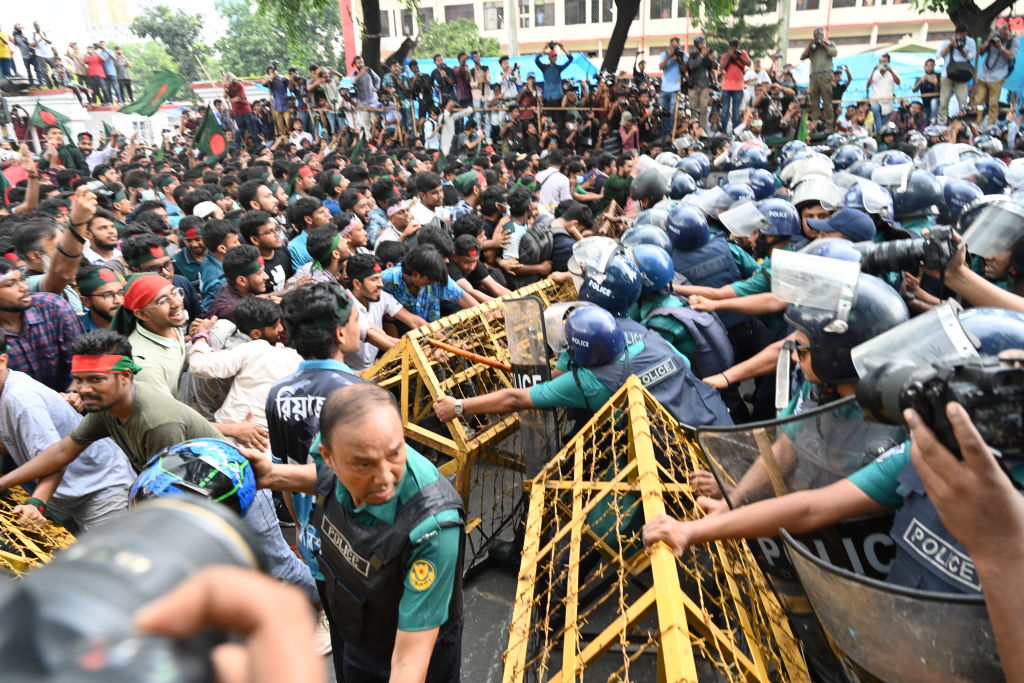In Bangladesh, at least four killed and hundreds injured in clashes between quota reform protesters and the police on Thursday during nationwide shutdown. The protesters on Wednesday called for a complete shutdown across the country to push home their demand to reform the quota system and protests the attacks on student protesters.
The protesters demonstrating against the government’s handling of the ongoing quota reform movement blocked major national highways, snapped Dhaka’s rail communication with the rest of the country and also paralysed metro rail operations in Dhaka.
Meanwhile, the Law, Justice, and Parliamentary Affairs Minister of Bangladesh Anisul Huq said that the government agrees in principle on quota reform and is ready to hold talks with the quota reform protesters, reports Bangladesh Sangbad Sangstha (BSS). “The Prime Minister has given me and Education Minister Mohibul Hasan Chowdhury the responsibility to hold talks with them. We want to have talks with them whenever they want, if they want to hold talks today, we are ready to do this,” the law minister said while briefing the media in Dhaka.
In view of the ongoing situation in Bangladesh, the Indian High Commission in Dhaka on Thursday issued an advisory for the Indian community members and the Indian students residing in Bangladesh to avoid local travel and minimize their movement outside their living premises.
To maintain law and order situation, the government has deployed 229 platoons of Border Guard Bangladesh (BGB) in addition to various police agencies across the country.
The universities Students and teachers have been staging protests demanding quota reforms in government jobs since July 1. Six people were killed and scores were injured on Tuesday as students’ protests against the job quota across the country turned deadly amid alleged attacks by police and ruling party affiliated student organisations on protesters.
The protests started in response to a verdict by the High Court on 5 June 2024, which declared the 2018 government circular cancelling the 30% quota for freedom fighters’ descendants in government jobs, illegal. The circular was issued in the wake of the 2018 Bangladesh quota reform movement.
Meanwhile, the United Nations has urged the Bangladesh government to protect the protesting students demanding quota reforms in the government jobs against any form of threat or violence.
Stéphane Dujarric, spokesman for the secretary-general, at Tuesday noon briefing in New York said that the UN was very much aware of the situation, which they were following closely and with concern.
The University Grants Commission of Bangladesh on Tuesday night said all public and private universities, its affiliated medical colleges and other institutions, will remain closed until further notice for the sake of students’ safety. The Education Ministry also announced on Tuesday the closure of all secondary and higher secondary educational institutions including polytechnic institutes until further notice.
After the independence of Bangladesh, 30 percent of the jobs were reserved for freedom fighters. In 1997, the government extended the quota to children of freedom fighters. In 2010, it was further expanded to include the grandchildren of freedom fighters.
In 2018, following nationwide protests against this quota system, a government circular cancelled the quota system for first- and second-class jobs. However, on June 5, 2024, the High Court ruled on a writ petition filed by the descendant of a freedom fighter and six others. The HC said the 2018 circular was illegal, meaning quotas were re-established in government recruitment once more. The government has appealed this ruling.
By: Navalsang Parmar (Dhaka)




















